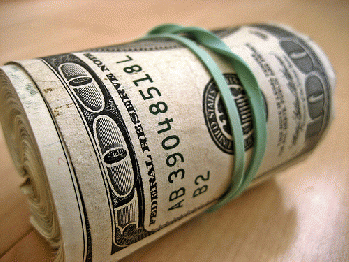In the wake of Trump presidency and the resurgence of rhetoric vis--vis illegal immigrants, whose number is about 11 million, a concern is growing regarding their exploitation by some business firms through paying them in cash, usually below the minimum wage rate. Cash payments and other concealed business activities pave the way for tax evasion and the ensuing costly consequences for the U.S. government, namely, the loss of tax revenue. The Tax Gap defined as "the difference between total amounts of taxes owed to the government versus the amount they [it] actually receive" is estimated to be about $500 billion annually according to IRS. I believe only a minor share of this amount is related to illegal hiring and sending money to their home countries by illegal immigrants. The lion's share of it is related to other illegal activities like money laundering, drug trades, and the use of cash to finance terrorism.
As of October 20, 2016, there was approximately $1,500 billion currency in circulation, according Federal Reserve data. More than 84% of this amount is in the form of $100 and $50 bills, making transportation of cash less toilsome for criminal purposes. An inquiring question is who holds this cash and why? Evidence shows that almost half of it is held outside of the United States to be used mostly for illegal transactions, and the other half is held domestically. While there are no accurate measures of the extent of the unlawful transactions taking place, the evidence shows that they are indeed growing and so are the ensuing costs for the U.S. economy. Some economists suggest that phasing out cash, namely $100 and $50 bills, can serve as a deterrent to the illegal activities facilitated by cash.
One may wonder why people in the U.S. still insist on using cash despite the availability of alternative means of payment that are better and more efficient including credit cards, debit cards, and online payments. And, why should the government, which has a monopoly on the production of fiat money, hesitate to phase out cash? The best answer is the perks that come with the use of cash such as convenience, real-time clearance, protection of privacy, and of course the lucrative unlawful trades. In addition, massive profit is gained by government from its monopoly on the production and issuance of money known as seigniorage.
Reliable data show that foreign demand for the U.S. dollar is not only strong but has been on the rise since great recession of 2008, with the bulk of it being for large denominations that are believed to be used mainly for global money laundering and other criminal activities. The U.S. government can effectively curtail such activities by gradually discontinuing the production of cash, as suggested by some economists. As cash is being phased out, government can establish a universal debit card payment system to facilitate transactions. Terminating cash is of course a radical idea that might be hugely disruptive and unpopular. However if doing so can help to undermine illicit activities and boost government tax collection, it will be a well worthwhile endeavor. Some other countries like Sweden, Denmark, and Norway have tried this approach with considerable success.
Cash is the popular means of transactions in the underground economy in the U.S. that includes a wide variety of activities that are deliberately concealed for tax evasion purposes including but not limited to illegal drug trade, extortion, bribery, human trafficking, and money laundering. The size of the underground economy in the U.S. is not that large in comparison to other advanced nations. It is reported as 7.1% of the GDP. The important concern, however, is that it has been growing, especially throughout the post-recession years due to growing income inequality and its resulting economic polarization. What's more, some ordinary law-abiding citizens use cash for tax evasion opportunities; because no one wants to pay taxes, every possible means to minimize or shift tax liabilities are utilized. In addition to the tax gap, tax evasion leads to horizontal equity , implying that if some people succeed in not paying their due share of taxes, others have to pay more.
As desirable as it sound, the complete elimination of untraceable transactions is evidently impossible; however, if the phasing out of cash reduces their frequency, it is a worthwhile achievement, according to many economists including Dr. Kenneth Rogoff, the author of a newly released book The Curse of Cash. The plan he has suggested is ground-breaking and will revolutionize the payment system of the U.S. while reducing illegal trades. He believes any plan aimed at phasing out cash should be guided by a few important principles including lowering illegal transactions, the gradual phase out of large bills leaving small denominations in circulation for extended period of time, providing easy access to a universal debit card system for all including unbanked and underbanked people, and finally protecting the privacy of law-abiding citizens.
Although rooting out currency sounds like an unconceivable proposition, experts believe it can be done in anticipation of the many collateral benefits as outlined above. It may not lead to the utter elimination of all illegal activities, it will, however, create a fatal setback for those who use money for criminal doings or financing terrorism and will discourage business companies from hiring illegal workers, an issue that many politicians are so preoccupied with nowadays. In addition, government may benefit handsomely if unreported transactions are diminished by enabling it to collect more taxes. However, it is doubtful, that politicians and other people who have financial stakes in keeping the status quo afloat would go along with such a drastic proposal
So, with all due respect to George Bernard Shaw who once said "Lack of money is the root of all evil," as this commentary suggests, too much money can be the source of many criminal activities and this will continue to be the case for now.






